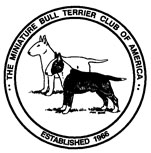|
GENETICS AND
HEALTH COMMITTEE REPORT October, 1999
As most of you already know, the
AKC Canine Health Foundation approved a study on lens luxation in the Mini
Bull to be conducted by Dr. Gary Johnson and his colleagues at the
University of Missouri. The AKC is providing $4000 for the study, and the
MBTCA is matching that amount. We hope that Dr. Johnson's work will provide
a DNA marker so that it will be possible to identify Mini Bulls that carry
the gene or genes responsible for lens luxation. We have asked the AKC
Canine Health Foundation to notify other parent breed clubs, whose breeds
also suffer from lens luxation, that the Mini Bull study is underway at the
University of Missouri', and to suggest that financial assistance from these
breed clubs would be very much appreciated. I don't know if there has been
any response. The other breed clubs that I suggested should be notified are
Fox Terriers, both Smooth and Wire; Sealyham Terriers; Jack Russell
Terriers; and Tibetan Terriers.
Susan Hall has contacted Dr.
Meurs and her staff at Ohio State concerning the possibility of having the
Mini Bull included in her ongoing study of heart disease, particularly of
subaortic stenosis. If the Minis are included, we will no doubt have to
provide some funds to support this project.
The GDC open registry for
recording the CERF test results for Mini Bulls, both normal and those that
have luxated, should be up and running. However, Dr. Poulos has not sent me
the necessary registration materials to get us started. I hope to see him at
the AKC Canine Health Foundation meeting in mid October. The third AKC
Canine Health Foundation Conference will be held in St. Louis on the weekend
of October 15, 16, and 17. I am looking forward to it, as the previous two
meetings in 1995 and in 1997 were excellent. I should be able to have a chat
with Dr, Johnson and also with Dr. Poulos. The various speakers, whom are
usually tops in their veterinary specialties, will report on the progress
they are making in their studies of various canine genetic health problems
as well as overall progress in understanding the canine genome. There will
be a report on the St. Louis conference in the next A Little Bull.
Meanwhile, the best way you can
help the health situation in Minis is to carefully research the pedigrees of
both parents before you do any breeding. Do not use a stud dog that has not
tested normal for hearing (BAER Test), heart function (Cardiac ultrasound
with Doppler), kidney function (less than 0.5 urine protein to urine
creatinine ratio), and vision (recent ophthalmic exam & CERF test).
Obviously, the bitch needs to pass the same tests! And don' t forget
temperament. If you have a disagreeable, snappish Mini Bull. it is not a
typical specimen of our breed and it should not be bred!
Also, if you do have puppies,
keep careful records of their progress, even after they have gone to their
new homes. If any problems surface, you need to notify the owner of the sire
and also owners of the littermates of the affected dog. It's only by sharing
information that we can hope to make progress in solving our breeds genetic
based health problems. Those of you who are new to our breed and have your
first Mini should have it health tested even if you never plan to breed it.
As your dog gets older, annual kidney and eve exams will identify problems
while they are in early stages. If your dog does develop health problems.
You need to tell the breeder. Your pet puppy's health is just as important
as that of any show dog!
-Marilyn Drewes
-Genetics and Health Committee
-MBTCA |
